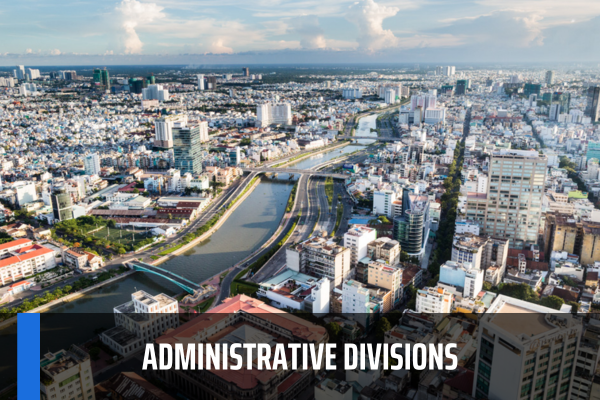What are the cases where arrangement of administrative divisions is not compulsory in Vietnam according to Resolution 35/2023/UBTVQH15?
- Vietnam: What are the cases where arrangement of administrative divisions is not compulsory according to Resolution 35/2023/UBTVQH15?
- What are the principles of arrangement of commune-level and district-level administrative divisions in Vietnam for 2023-2030 period?
- What are the regulations on naming and renaming administrative divisions established after arrangement in Vietnam?
Vietnam: What are the cases where arrangement of administrative divisions is not compulsory according to Resolution 35/2023/UBTVQH15?
On July 12, 2023, the National Assembly Standing Committee issued Resolution 35/2023/UBTVQH15 on arrangement of commune-level and district-level administrative divisions for 2023-2030 period.
Accordingly, in Article 3 of Resolution 35/2023/UBTVQH15, there are regulations on cases where arrangement of administrative divisions is not compulsory as follows:
Cases where arrangement of administrative divisions is not compulsory
1. It is not compulsory to arrange commune-level and district-level administrative divisions subject to arrangement if such administrative divisions have one of the following factors. To be specific:
a) Their locations are isolated and difficult to organize traffic for the purpose of convenient connection with adjacent administrative divisions;
b) Their administrative boundaries have been stably established and since 1945, there is no any change or adjustment;
c) These administrative divisions have crucial national defense and security value or have characteristics of typical historical traditions, culture, ethnicity, religion, beliefs, customs and practices and if these administrative divisions are arranged with adjacent administrative divisions, national defense and security, and social order and safety are no longer stable;
d) These administrative divisions are rural administrative divisions subject to arrangement whose planning for development into urban administrative divisions for the 2023-2030 period has been approved by the competent authority, and geographical area and population size meet the area and population standards according to regulations in Resolution of the Standing Committee of the National Assembly on standards and classification of administrative divisions.
2. For the 2023 – 2025 period, it is not compulsory to arrange commune-level and district-level administrative divisions that have been arranged in the 2019 – 2021 period.
3. For the 2026 – 2030 period, it is not compulsory to arrange commune-level and district-level administrative divisions that have been arranged in the 2019 – 2021 period and the 2023-2025 period.
Accordingly, districts and communes belonging to one of the above cases will not be required to arrange administrative divsions for 2023-2030 period.
If it is necessary to make arrangement to organize commune-level and district-level administrative divisions in a reasonable manner, the provincial People's Committee shall make a report in the overall plan and project on arrangement of local administrative divisions in order to submit to the competent authority for consideration.

Vietnam: What are the cases where arrangement of administrative divisions is not compulsory according to Resolution 35/2023/UBTVQH15? (Image from the Internet)
What are the principles of arrangement of commune-level and district-level administrative divisions in Vietnam for 2023-2030 period?
Pursuant to the provisions of Article 2 of Resolution 35/2023/UBTVQH15, there are 06 principles of arrangement of commune-level and district-level administrative divisions for 2023-2030 period. Specifically as follows:
Principles of arrangement of commune-level and district-level administrative divisions
1. Ensuring the leadership of the Communist Party and enhancing roles in leadership and direction by heads of organizations and agencies of arrangement of commune-level and district-level administrative divisions.
2. Complying with the Constitution, making arrangement within their competence and following procedures specified in the Law on Local Government Organization, this Resolution and other legal documents.
3. Being consistent with provincial planning, rural planning, urban planning and relevant others.
4. Focusing and thoroughly considering specific factors of historical traditions, culture, ethnicity, religion, beliefs, customs, practices, geographical location, natural conditions, residential community and requirements for national defense, security, social order and safety, and socio-economic development.
5. Focusing, successfully disseminating information and mobilizing the People in order to create consensus, support and full agreement on the policy on arrangement of commune-level and district-level administrative divisions; organizing collection of voters' opinions in communes and districts in a public and transparent manner according to regulations in the law.
6. Connecting arrangement of commune-level and district-level administrative divisions with innovation and arrangement of organizational apparatus of the political system towards a streamlined, efficient and effective system; downsizing, restructuring and improving the quality of officials, public employees and employees; providing benefits for officials, public employees and employees in a reasonable manner; applying special policies to commune-level and district-level administrative divisions after the arrangement.
Thus, in the period 2023 - 2030, the arrangement of district and commune-level administrative divisions will be carried out according to the above principles.
What are the regulations on naming and renaming administrative divisions established after arrangement in Vietnam?
Pursuant to Article 6 of Resolution 35/2023/UBTVQH15, there are provisions as follows:
Naming and renaming administrative divisions established after arrangement
1. Naming and renaming administrative divisions that have been established after arrangement shall comply with regulations of the Law on Local Government Organization and the Resolution of the Standing Committee of the National Assembly on standards and classification of administrative divisions; ensure national unity, be consistent with local historical, traditional and cultural factors and respect the opinions from the majority of voters.
2. In case of merger of administrative divisions at the same level, it is recommended to use one of the existing names of the administrative divisions before merger to name the administrative divisions established after arrangement.
Thus, for administrative divisions established after arrangement in the period 2023 - 2030, naming and renaming will be carried out according to the regulations mentioned above.
LawNet